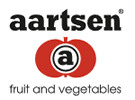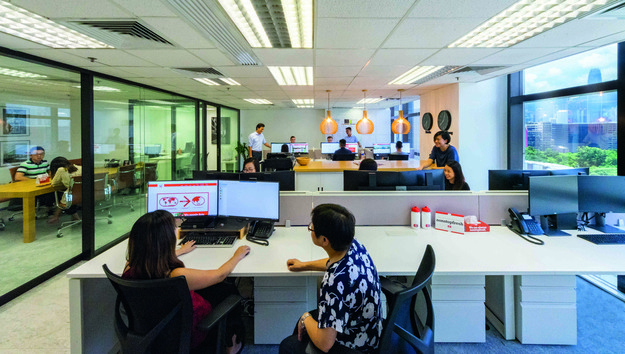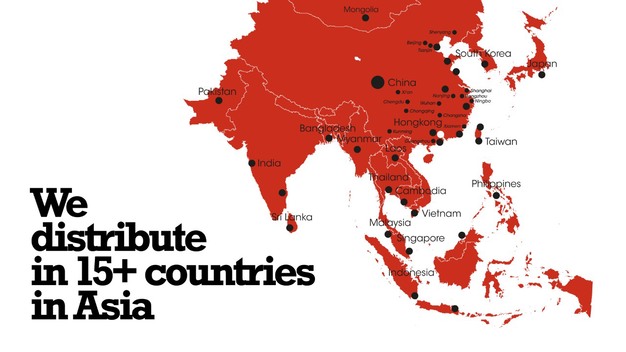 Seven years ago, the Dutch company, Aartsen, opened its doors in Hong Kong. In the run-up to Asia Fruit Logistica, we look back with Menno van Breemen at developments on the Asian market.
Seven years ago, the Dutch company, Aartsen, opened its doors in Hong Kong. In the run-up to Asia Fruit Logistica, we look back with Menno van Breemen at developments on the Asian market.
"We started our business in Hong Kong in 2012. Back then, we had the same strategy in mind as we use for Aartsen in Europe. A broad import package and extensive sales on the free market. We have not deviated from this course."
"Look at Aartsen's import package in Europe. It consists of 650 growers from across the world. They represent an enormous spread of products. In Asia, the same package is made up of about 200 farmers," says the MD of Aarsten Asia.
"We currently have year-round distribution. This is done via more than 100 of our partners' sales points in more than 15 Asian countries. From citrus, grapes, berries, cherries, apples, stone fruit, and so on, to all kinds of exotic fruits - you name it, we handle it."
"We have far-reaching distribution and constant 'year-round' trade. This means we have a strong position in different markets - Nonstopfresh. In the past year, we sold 4,5 million boxes of fruit in Asia," continues Menno.
"There is another development within Aartsen. We are implementing a new computer system. It brings so many more possibilities for Aartsen and our global partners. For example, there will be a portal where people can see their shipments' status. This status will include quality control reports, sales information, and so on."
"Technology moves fast. By keeping up with these changes, we can position ourselves as a progressive company, on a technical level, too," Menno says.

When asked what Aartsen's focus is on the Asian market, he answers, "We are focused on the free market, in Asia as well as Europe. No supermarket business. We distribute to importers, wholesalers, re-export and catering companies, hotels, casinos, the industry, online business, fruit shops, etc."
"We service many different Asian countries. Of these, China is, of course, a very important market. We have a good position in China's main markets. We have already started with development in 2nd and 3rd tier cities. We will eventually pick the fruit of our labor with certain products there," he goes on to say.
"When we look at South-East Asia, there is growth in several countries. The strongest is in Vietnam, Cambodia, Myanmar, Malaysia, Taiwan, and the Philippines."
"Considering volumes, grapes are our most important product. This product is followed by oranges, cherries, and blueberries. These product volumes keep growing steadily too. This growth is a natural process via the many sales points we have established over the years. However, looking at percentile growth, the most significant increase is in apples, pears, and stone fruit. We are also selling more exotic fruits like figs, granadillas, and pitahayas."
"We also do vegetables, but in limited amounts. This strategy has to do with the large amount of local production. They are also more and more a supermarket item in Asia. Our vegetable sales in Europe amount to 40%; in Asia, this is only five percent," explains Van Breemen.
"We also import all manner of Asian products via Aartsen in Europe. Think of Chinese pears, pomelos, and ginger. We get products from Malaysia and Thailand too. These include carambolas, pitahayas, lemongrass, mangosteen, galanga, baby corn, turmeric, rambutan, and so on. Here, we also try to distinguish ourselves. We market everything under our own private label, Yami. The label focuses on quality."

There are challenges aplenty in the Asian market. "Working in more than 15 countries is not always easy. You work with different cultures and customs. You have to know about these cultures. And do not forget about the languages. At the office, the staff speaks local dialects. Because we are in the area, we spend a lot of time in the various markets. This is key," the MD continues.
"There is also not a single market with high returns in Asia. It is essential to get the correct product to the correct place. This place is not necessarily a country. Within one country, there are different regions. These regions all have different wishes and requirements. Specific sizes of cherries sell for higher prices in different areas in China."
"At the same time, this also presents opportunities for companies that can handle this with care. So, it is as it has always been. The things that are not simple, are often interesting," Van Bremmen says.
From 4 to 6 September, Aartsen will have a stand at Asia Fruit Logistica. "Since we are in Asia, we always have our own stand at Asia Fruit Logistica. In these three days, we see and talk to many of our business partners. We evaluate what can be better, what our strategies are for the future, and so forth."
"We are always on the lookout for new products and establishing new contacts. There is always something new and interesting. This time, we have thought outside the box. We have an original stand. We are looking forward to a good fair. We welcome one and all to our stand in Hall 3 - F36," Menno concludes.
For more information:
Menno van Breemen
Aartsen Asia Ltd.
Tel: +852 37 05 55 07
Mob: +852 93 19 80 78
[email protected]
